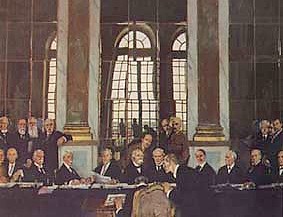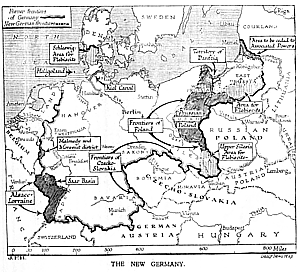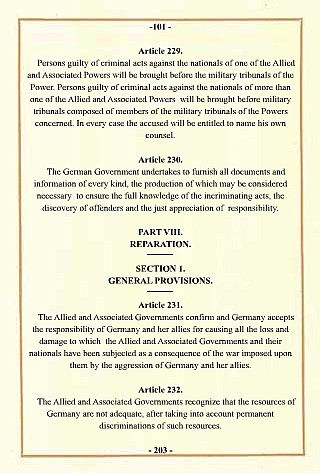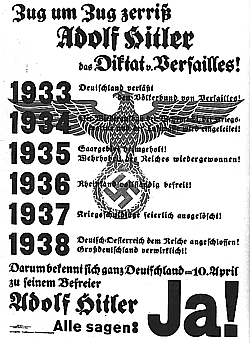Introduction (back
to top)
World War I ended in 1919 with the signing of the Treaty of Versailles
in the Hall of Mirrors in the palace built by Louis XIV in the Paris suburb
of Versailles. Symbolically, it was the same place where Otto von Bismarck
had celebrated the French defeat in 1871 by proclaiming a German Empire
after the Franco-Prussian war that finalized the unification of the German
state and signaled the rise of Germany’s military power. The treaty was
finalized by the victors in late April 1919 and handed to the German representatives
on May 7. The German populace believed that the treaty was unfair. The
Germans tried to have changes made to the treaty, but their efforts were
futile. The allies threatened with the continuation of hostilities and
the starvation blockade unless the Germans signed: "…in 1919…not only
refused to accept the German reservations, but gave twenty-four hours
within which to sign without conditions, in default of which the troops
would march" (Dawson, 82). Germany's military commanders, fully aware
that the German military could not form any strong defense, advocated
the signing of the treaty. The treaty was signed by Germany on June, 28,
1919.
There was immediate condemnation of the Versailles Treaty by the German
populace. The German state was not expecting to lose the war. When the
dust settled and the harsh reality of defeat was made clear, the German
people were dumbfounded. It was a military defeat, but also a psychological
defeat for the German state. "…the German people were expecting victory
and not defeat. It was the acknowledgement of defeat, as much as the treaty
terms themselves, which they found so hard to accept" (Henig, 27). The
terms which caused the most resentment in Germany were the loss of territory,
the war guilt placed solely on Germany, the deliberate effacement of the
German military and the demands of reparations.
|



